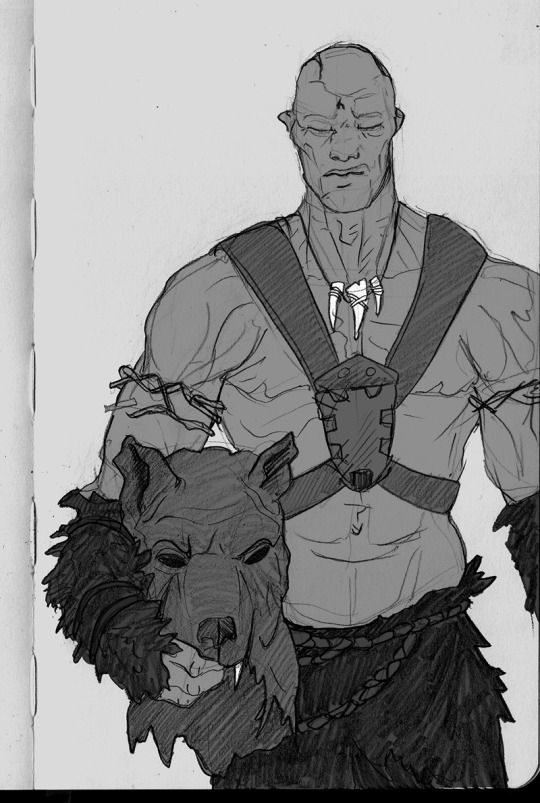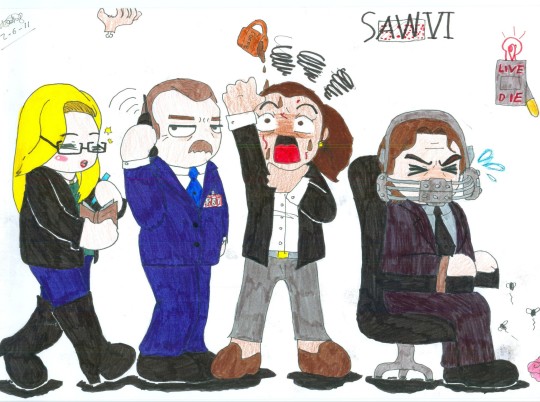#Erickson
Explore tagged Tumblr posts
Text

◆Nice hat◆
bonus under the cut

i just had to include him
#fallout art#fallout erickson#far harbor#erickson#fallout 4#fnv#vulpes inculta#fallout new vegas#i dont want to tag Galmar here😭#also sorry i have no idea how to draw backgrounds right 🥲
808 notes
·
View notes
Text


Erickson, the friendly supermutant from Fallout 4's Far Harbor. With and without hat.
362 notes
·
View notes
Text

Construction worker Erickson
116 notes
·
View notes
Text
Erickson was a Creep
I had not planned to write this blog post or milkshake duck a popular hypnosis hero, but I went down one rabbit hole too many and something snapped into focus.
Milton Erickson was a creep.
There's no way to sugarcoat this. If he was practicing today, he would almost certainly be reported for his practices. Even for his time, he was thought of as creepy.
Richard Bandler notes in Trance-formations that Satir thought Erickson was creepy.
Virginia [Satir] had met Milton and thought he was creepy and didn’t want anything to do with him.
But we don't need to rely on Satir's personal opinion of him. We can cite sources.
Hilgard thought the same thing, although he is more indirect about it. From Milton Erickson as Playwright and Director / scihub link, Hilgard starts us off with a case where husband and wife pees the bed, and his solution is to have them deliberately wet the bed every night for two weeks.
You have your instructions. There is to be no discussion and no debating between you about this, just silence. There is to be only obedience, and you know and will know what to do. 1 will see you again in five weeks’ time. You will then give me a full and amazing account. Goodbye! [Volume IV, 1954, p. 100, emphasis in original].
It gets worse.
We have this example of what Erickson would do when his patient was sexually attractive, emphasis added in places.
One such pair of cases is provided by two disheveled girls with poor self-images, who were treated at different times. These patients differed in that one of them, although slightly overweight, he saw as sexually attractive, even in her present physical condition. The other, extremely overweight, could not appeal to him as sexually attractive, and these differences between the two influenced his choice of scenario. The first, the basically more attractive one, he prepared for the fact that he would shock her, but it would be helpful, dramatically so. “I will outline a course of behavior for you, and this you are to execute without fail. Do you give me your absolute promise [Volume IV, 1930s, p. 485]?” He then referred to her pubic hair as the pretty patch of fur between her legs, and requested that she look at herself in the nude that night before the mirror, examining herself particularly from the waist down and to be pleased by what she saw. “Try to realize how much you would like to have the right man caress your pretty pubic hair and your soft rounded belly” [Volume IV, 1930s, p. 486] The next night she was to examine the upper part of her body, admiring particularly her breasts. In each case she blushed profusely at the suggestions, but was then given amnesia for them, and carried them out, with additions of her own which she was not asked to describe. In the next session, Erickson, after having built her up, attacked her severely for her appearance, her lack of cleanliness, her unkempt hair, and the stains on the dress she had worn each time she came to see him.
When the patient is unattractive, there is no attempt to get her to caress her pubic hair and carry out unnamed additions in front of a mirror, and deal with resistance by giving her amnesia. It's right on to the abuse.
The second patient, the overweight one, he approached immediately with a severe and brutal tongue lashing about her homeliness and fatness and unkempt appearance. Note that in the first case this attack was delayed until some self-confidence had been restored. He was confident that in the second case, the only way she would know that he would be honest with her was to speak out harshly and aggressively. After listening to this onslaught, she agreed to go on in therapy. The behavioral practices assigned to her were numerous library assignments. One had to do with searching out anthropology books to find out how all kinds of misshapen women were able to find someone to think them attractive and marry them. Other assignments opened her eyes to practices in orthodontia, plastic surgery, cosmetology, and hair dressing. The treatment of these two patients with somewhat similar symptoms had in common only the shock of brutal assessment of their deficiencies, delivered at different stages of treatment, and the referral to store clerks to improve the manner in which they dressed.
Hilgard stops here, but the implication is clear: if Erickson thought a female patient was sexually attractive, his approach would include sexual elements.
This is further borne out by My Voice Will Go With You. Let's start by picking out Erickson's intervention with a "sexually numb" woman. It turns out that all she needed was for Erickson to describe a penis, and this is enough to give the woman her first orgasm.
A woman had secured a divorce because she went all numb sexually and this had troubled her husband very much. He couldn't stand living with an unresponsive woman. Then she had a number of boyfriends. She was now living with a man who was separated from his wife—a terribly sordid life. He wanted to have her as his mistress. He placed his children first, his wife second, his mistress third. And she didn't have any response at all. The man was a wealthy man. He gave the woman a lot of things she liked. And she said, "I'm just plain cold. I have no feelings. It's a mechanical thing For me." In a trance, I explained to her about how boys learn to recognize different feelings in their penis—when it's limp, a quarter erect, halfway erect, fully erect. How it feels when detumescence occurs. How it feels when the ejaculation occurs. And I explained to her all about wet dreams in boys. I said, "In every boy half of his ancestors are feminine. And what any boy can do, any girl can do. And so you can have a wet dream at night. In fact, you can have a wet dream any time you wish. In the daytime you may see a handsome man. Why not have one then? He doesn't need to know about it. But you can know about it." She said, "That's an intriguing thought." I noticed that she became abnormally still. Her face flushed. She said, "Dr. Erickson, you've just given me my first orgasm. Thank you very much."
There's another case that starts with a girl farting in the classroom. Erickson shows her his anatomy book, shows a cross-section of the rectum, and tells her to eat beans and start farting.
Then I told her, "Now, I want you to demonstrate earnest, honest respect for God. I want you to bake some beans. They are called whistleberries by the navy. Flavor them with onions and garlic. And get in the nude and prance and dance around your apartment, emitting loud ones, soft ones, big ones, little ones ... and enjoy God's work."
A year later, she's married and gets her breast to nurse her child in front of him. Success!
And she did that. A year later she was married and I made a house call to check up on her. She had a baby. And while I was visiting her, she said, "It's time to nurse the baby." She opened her blouse, exposing her breast, and fed the baby and chatted casually with me, A complete change of reference.
It gets worse.
A twelve old girl phones up Erickson and says "I had infantile paralysis and I have forgotten how to move my arms. Can you hypnotize me and teach me?" I want to know how she picked up the phone and called Erickson with her arms not working, but let's take this at face value, and assume this happened just like Erickson said. What does Erickson do? Have her strip to the waist in front of her mother.
I told her mother to bring her over and her mother brought her over. I looked at the girl. For a twelve-year-old girl she had a very well developed bust, except that the right breast was under her arm, I had the mother strip the girl to her waist and I looked over her entire torso to see what the muscles were.
Then he had the girl make faces repeatedly. No, really.
Now, when you start one muscle moving there's a tendency for that to spread to other muscles. You try to move just one finger. You start to spread the movement, unintentionally. Her arms began to move. Now, the right breast migrated from under her arm to one side of her chest. She is now a lawyer, practicing law.
So, the cause was that she had a breast under her arm. and it caused her arms to stop working. She needed Erickson to explain this. And the solution was to make faces. Can you imagine someone doing this in 2024?
He also asks his wife to check out his daughter's breasts.
In watching my daughters I discovered that happened somewhere around ten years of age. When, for example, Betty Alice was about ten years old and had to pick something off the bookcase or radio, she lifted her arm this way (as if to avoid a large breast). I told Mrs. Erickson, "When Betty Alice takes her bath have a look at her breasts." Mrs. Erickson came out and said, "There's just the beginning of a change in her nipples."
By all accounts, Erickson was driven by a deep-seated need to control, to the point that it damaged his relationship with his daughter. In Cardeña's review of Wizard of the Desert, he describes a section of the DVD.
One of Erickson’s daughters (and executive producer of the documentary) relates with sadness that growing up she could not have just a normal conversation with either her mother, who hyperintellectualized everything, or her father who, although not fully stated, seems to have been in therapist/teacher mode 24/7. Erickson is also described as punishing and sadistic in the demands he imposed on some of his clients, and it is evident that he blurred the boundaries between personal and professional life that therapists are expected to maintain.
Cardeña also says that maybe, just maybe, we should consider that a man who was known to lie to people for therapeutic goals might possibly be lying to his colleagues and students.
To muddy the waters even more, why have not some of the followers of a therapist known to fabricate false past stories to achieve therapeutic goals wondered whether he used that same technique in his writing and teaching?
There's more than this than just the personal creepiness, of course. Erickson's definition of a cure was essentially to conform into society, and you can see that in his definitions of success. Became a lawyer. Got married. The success and meaning is external. Bandler refers to it.
In many ways Milton was one of the most directive hypnotists you would ever want to meet. He only had five goals for people to get well: get out of the hospital, get a job, get married, have children, and send him presents. That was his definition of a cure.
And Erickson was not shy about taking credit for things that he should not have taken credit for. Going back to Hilgard, he describes the case of a WWII vet who Erickson touts as a success.
Harold was a veteran of World War 11 who entered treatment at the age of 23 with a poor background and a bad image of himself as a moron. He changed during treatment from a miserable unskilled laborer through a series of transformations, all the while convinced by Erickson that he was succeeding despite the fact that he was feebleminded. So powerful was Erickson’s strategic control through distorting his self-perception by way of hypnotic amnesia, distractions, redirection of attention, and confusion, that after learning shorthand and typing, serving as a private secretary for 18 months, and making A-grades in college, only then was he given permission to discover that he only thought he was feebleminded.
Erickson's priority was in getting this man fitted into society, and then dealing with his mental issues. And Erickson took credit despite the many, many people helping this man.
As I have noted earlier, despite his strongly authoritarian position as playwright and director, Erickson typically set the stage and the strategy, but left the tactics up to the patient. What is not so evident is the role of many others in producing the therapeutic successes: Joe, who enhanced Harold’s use of the library beyond the reading of children’s books; the married couple who befriended him at the trailer court; the friend who taught him to drive a truck; the transcriber and annotator of rare manuscripts with whom he lived and talked for a year and a half; his teachers (shorthand and typing, piano, guitar [?]), and his college teachers-all of whom are missing from the case study except for the briefest of mention of the piano teacher because she was a woman. [...]
Hilgard goes on to say that Erickson may have had a very direct warping presence on his patient through his control.
Harold’s life away from Erickson may have been very different from the way he appeared in Erickson’s presence. We do not know how fond he became of his teachers or they of him. Although he occasionally asked about Harold’s daily activities in detail, Erickson appears to have been more interested in his own cleverness than in finding out how Harold was perceived in the context of his daily life.
Hilgard says Erickson was essentially given carte blanche to behave however he wanted.
His hypnotic authority allowed Erickson to play the theatrical game of distortion and deception - insisting on Harold’s prolonged compliance with the belief that he was feebleminded. I cannot image any nonhypnotist attempting this, or, for that matter, any other hypnotist. This insistence appears to be specifically Ericksonian, fitting his love of dramatic strategies.
And Hilgard specifically calls out Erickson as doing this for his own personal gratification.
Was Erickson perhaps in some manner overcompensating for his physical weakness by enjoying the power that he achieved over his patients, and gaining vicarious satisfaction over the encounters he assigned them in the real world, some in areas denied to him?
And potentially not only misleading or misdirecting his peers, but also himself.
Had Erickson’s own dramatic way of planning and promoting his own cases led him to some self-deception in the cases as reported? He was unusually good at rationalizing whatever he happened to do, and occasionally appeared to justify failures by converting them into planned successes, as in the case of Harold’s failure in algebra.
The fact that so many of his stories include salacious and unnecessary details is an indication of what Erickson wanted from his patients: unquestioning obedience, humiliating and degrading instructions, gratuitous exposure of women's bodies, and all of it putatively for the patient's benefit.
Even at the time, people knew Erickson's behavior was creepy. As Hilgard notes, if Erickson did not have the stature and the myth associated with him that he had, he would have been treated very differently. His privilege and power protected him from consequence and enabled his behavior to go unchecked.
It is very doubtful that Erickson would have been able to do this in modern day times. He would have been reported, his instructions and conduct recorded. If a disciplinary board didn't deal with him first, he would be showing up on Youtube as a comedian's punch-line.
But the next time you think "What would Erickson do?"
Maybe don't do that.
31 notes
·
View notes
Text
Существует 5 принципов Милтона Эриксона в работе с клиентами, которые помогали ему и его последователям изменять мышление человека. Они же легли в основу такого популярного сейчас направления, как коучинг. Эти принципы создают определенную "линзу", глядя сквозь которую, вы можете преобразовывать качество восприятия того, что предлагает вам жизнь. Принципы работают как способ создания глубоких отношений с людьми и с самим собой. Если мы воспринимаем себя как целостных и дееспособных, то п��лучаем возможность — осознанно или неосознанно — учиться у собственных страхов и работать с ними в роли партнера, а не жертвы. Когда ваш выбор — видеть, слышать, чувствовать и доверять себе и окружающим людям во всей их полноте и целостности, вне зависимости от истории их жизни, вы соединяетесь со своей силой так же, как и с их силой. Полезно думать о пяти основных принципах Эриксона, как о звезде, где каждый принцип подобен лучу.
1. Принцип «Все люди OK»: Этот принцип означает, что каждый человек хорош таким КАКОЙ ОН ЕСТЬ. Принцип основан на представлении, что все во Вселенной просто существует. Каждое явление — нормально, с ним все в порядке, потому что оно не может быть ничем иным, как самим собой. Нередко мы считаем себя, свои поступки или других людей «ненормальными». И это является причиной тому, что мы перестаем работать над собой, опускаем руки или отказываемся понять другого человека, наладить отношения с ним. Однако, согласно первому принципу Эриксона, априори мы все нормальны. И не стоит оправдывать какие-либо жизненные сложности, неудачи своими странностями, которые произошли от детских травм или горького жизненного опыта. Тот же принцип действует по отношению к другим людям – с ними все ОК, просто на данный момент мы не в силах их понять, либо не желаем этого делать.
2. Принцип: «Люди уже обладают всеми внутренними ресурсами, которые им нужны». У каждого человека есть все ресурсы для того, чтобы достичь того, что он хочет. У каждого человека (в том числе и у Вас), есть все необходимые ресурсы, как внешние (деньги, связи, люди и др. материальные и информационные ресурсы), так и внутренние (опыт, знания, умения, таланты).
3. Принцип наилучшего выбора: «Люди всегда делают наилучший выбор, который могут в данный момент» Это означает, что каждый человек всегда делает лучшее из того, что он ил�� она может, основываясь на внутренних возможностях, которые подходят для него или нее. Считайте, что когда Вы оцениваете поведение людей как «плохие решения», вы тем самым подтверждаете привычные образцы, которые критикуете. До тех пор, пока у вас есть кривобокое восприятие того, как «должно быть» или «должно было бы быть», ваша жизнь будет подвержена чувствам расстройства, разочарования и негодования. Оглянувшись в прошлое, можно увидеть множество поступков и решений, которые были приняты нами. Нередко мы оцениваем данные поступки и решения неверными. Тем не менее, важно принять то, что любое решение, принятое нами является самым лучшим для той конкретной ситуации и для нас в тот момент времени. Поэтому, не стоит никого судить и осуждать. Согласно этому принципу, мы делаем выводы и двигаемся вперед без чувства вины и обиды.
Единственный путь искренне поддерживать людей, включая себя, это относиться к ним как к целостным и полным личностям, какими они и являются.
4. Принцип:«Каждое поведение имеет положительное намерение» или «В основе ВСЕГДА позитивно намерение». Природа человека заключается в том, что цель любого поступка – желание чего-либо хорошего для себя. Таким образом, действия людей, даже те, которые причиняют вред окружающим, не несут изначально негативного заряда. Дело лишь в том, что не всегда люди выбирают экологичный способ достижения цели. Но понимание этого позволит лучше понять мотив действий человека и найти с ним общий язык.
5. Принцип: «Изменение неизбежно» Изменения не только возможны, но и неизбежны. Все меняется и мы меняемся. Другое дело — в каком направлении?
В самом общем случае у нас всегда есть выбор: либо вверх — счастье, успех, любовь, развитие своих талантов, на благо других людей и Мироздания. Либо вниз — страдание, обида, гнев, раздражения, болезни, одиночество.
Когда эти пять эриксоновских принципов интегрированы в вашем уме и сердце, они могут открыть доступ к вашим внутренним ценностям и самоорганизации.
2 notes
·
View notes
Text
Here's my list of 'Top 5 Characters Evan(me) wishes he could romance within the entire Fallout game series'
⁀↘‿↗⁀↘‿↗⁀↘‿↗⁀↘‿↗⁀↘‿↗⁀↘‿↗⁀↘‿↗⁀↘‿↗⁀
5. Nick Valentine

-I like robocop.
-He's one of those characters I talk about constantly to my parents.
-I loved building a friendship with him.
-Idk what else to say but uh... He's a dreamboat???
4. Erickson

-I didn't know how to feel about him at first, but then I was like 🥺
-He's respectful, he takes care of dogs, and he offers me food + a bed to sleep in.
-I've spent over 4,000 caps on buying dogs from him(my favorite being Gracie)
-To be honest, I'd kill to just be bffs with him.
3. Sergeant Arch Dornan

-Bro makes me giggle.
-Would've killed someone to have him as a companion.
-I'm the mo-ron he's talking about.
-I think I'd end up breaking down if he yelled at me.
2. Lieutenant (Lou?)

-He's so elegant like--
-I am not ashamed to say that I'd pick him over Valentine any day.
-Love how he calls me dear human lmao (in the game y'know)
-I do not like how he'd want to turn me into a super mutant tho.
1. ✨Harold&Bob(all games)✨

-God I love him so much.
-He's an extremely lovable character.
-He goes from homeless guy, to cranky peepaw branch, and then all the way to big depressed tree(+he's in the bos game, but I'm if-y on it)
-I really wish he was a fallout companion because then I could read to him and show him my collection of random things.
-Also I love taking care of plants so expect this guy to have the best plant care known to man.
⁀↘‿↗⁀↘‿↗⁀↘‿↗⁀↘‿↗⁀↘‿↗⁀↘‿↗⁀↘‿↗⁀↘‿↗⁀
#Also honorable mention: Set the ghoul king(?)- Im so down bad for that guy and i love how grumpy he is-#-+that voice??? *faints*#fo4#fallout 4#nick valentine#erickson#erickson the super mutant#fo3#fallout 3#harold#fo3 harold#fo2#fallout 2#fo2 harold#sergeant arch dornan#sergeant dornan#fo2 sergeant dornan#fo1#fallout 1#fallout#fo1 harold#fo1 lieutenant#lieutenant#im a certified harold fan#maggot talks
50 notes
·
View notes
Text

Saw VI people, the last Saw drawing from 2011. Saving Jill for the Next one ಠ‿ಠ
#saw fanart#saw#saw franchise#saw VI#mark hoffman saw#mark hoffman#pamela#erickson#perez#reverse bear trap
14 notes
·
View notes
Text
Erickson.com Sells for $101,200 in Major Domain Deal
In a noteworthy domain sale, Erickson.com changed hands for $101,200 on November 8, 2005, through Moniker/DomainSystems. This transaction underscores the growing value of premium domain names in the mid-2000s, particularly those featuring common surnames. The Value of Surname Domains The six-figure sale of Erickson.com highlights the strong market demand for surname-based domain names.…
#.com#domain#domain aftermarket#Domain Auctions#Domain Name Investing#Domain Names#Domain News#domain sales#domaining#domaining.com#domains#Erickson#Erickson.com#Moniker#moniker.com
0 notes
Text

1 note
·
View note
Text
innie mark is gonna have to watch himself watch petey die and do nothing about it because he doesn’t know him. outie mark is gonna have to watch himself talk to his wife for hours and do nothing about it because he doesn’t know her. mark is gonna feel the love for his wife and the love for helly at the same time. two different people inhabiting one brain. i’m so sick
#different people but yet the same… mark and his love his sheer love that transcends severance. he loves so much#severance#severance spoilers#im gonna throw up on my desk and make my coworker clean it up. dan erickson kissing ur shiny little forehead
7K notes
·
View notes
Text
I'm not sure about this. Erickson obviously knew his stuff, but as someoner who embraces their observer in trance, and is very much aware of it (and find it fascinating), this rubs me the wrong way.
But this is only a tiny fragment of a larger piece - I may not be seeing the full picture.

Erickson is so ahead of his time here: If a subject feels like they are "observing" too much, it FEELS like they're not in trance, even though there's no actual problem with being conscious in trance.
So just deal with the FEELING of observation/analysis.
219 notes
·
View notes
Text
NIDS
National Identity Deficiency Syndrome
The official civic malady of Columbus
-- Erickson
0 notes
Link
What work needs to be done in the office? Justin and Lance are joined by Robin Erickson, VP of Human Capital at the Conference Board, to discuss the disconnect between workers and employers and what employers can do to attract and retain workers. tags: tsou, justin weller, lance jackson, robin erickson, economy, jobs, career, salary, work, office, pandemic, money, time, flexibility, home, family, labor, market
#career#economy#erickson#family#flexibility#home#jackson#jobs#justin#labor#lance#money#office#pandemic#robin#salary#time#tsou#weller#work
0 notes
Photo

Exterior Concrete in Vancouver Inspiration for a modern gray three-story concrete exterior home remodel
0 notes
Text

Prime Minister's Summer Office Langevin Block Ottawa, Ontario, Canada Designed 1970 with Francisco Kripacz Photo by Fiona Spalding-Smith
0 notes




